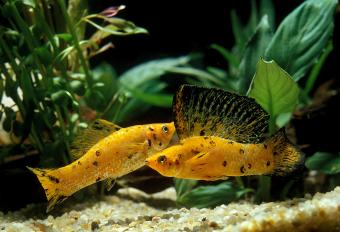
Have you ever wondered if betta fish sleep? This isn't a silly question, and many betta enthusiasts have asked it at one point or another. In fact, the answer may actually surprise you.
All Fish Need Sleep
Fish may not tuck themselves into bed at night, but they all sleep at one point or another. Fish that are primarily active at night sleep during the day. Fish like bettas, which are mainly active during the day, do most of their sleeping at night. According to the Sleep Foundation, "the circadian rhythms of fish appear to be sensitive to light, similar to the human circadian rhythm that prompts us to feel alert during daylight and sleepy after dark."
What is Sleep Like for Betta Fish?
The question still remains whether bettas experience sleep in exactly the same way that people do. After all, they can't close their eyes because they have no lids. So it's not immediately apparent what they are up to.

Do they fully lose consciousness, as people do? Perhaps not, since they are very territorial and on constant guard against interlopers, even if they are the only fish in their tanks. Still, they do appear to take time out to rest, and this is the equivalent of sleep for humans.
How to Tell When Your Betta is Sleeping
You can assume a betta will take the opportunity to get some real rest anytime their environment goes dark. This typically happens when you shut off their tank light for the evening. After a short time, they'll find a comfortable spot to rest and become inactive until something startles them or the light returns.
Bettas May Take Short Daytime Naps
Bettas sometimes take short naps during the day. If you've ever noticed your pet lying on the bottom of the tank doing nothing in particular, they could be asleep. You may notice your fish resting at the base of a plant or perhaps even resting amongst the leaves. Bettas like to find a secure place to rest when they can, so they'll scout out spots beneath or inside tank ornaments, behind filters, and anywhere else that makes them feel safe from harm. In other cases, your fish may hang motionless at the top of their tank while they rest.
Some people panic when they find their betta in either state because they think their pet has died, and indeed, there is not a lot of difference in the way a sleeping betta and a dead betta look. Thankfully, the fish is simply asleep in most instances.
Is My Betta Asleep, Sick, or Dead?
Since sleeping bettas can float at the top of a tank or lay on the bottom, it's easy to mistake a sleeping fish for one that has died. According to the Sleep Foundation, "some may appear to stop moving completely and can even be touched or handled without waking up."
There are a few clear indications that your fish is near death or that they have died:
Lethargic Behavior
If your betta has recently seemed lethargic, remaining at the bottom of their tank without moving or in a hiding spot for days.
Off Balance
If you notice them swimming oddly, as if he is off balance.
Coloration
If their coloring seems less vibrant than usual.
Big Eyes
If their eyes seem overly big and as if they're moving out of the body, which is called "popeye."
Ragged Fins
If their fins look ragged and unhealthy, or pressed against their bodies rather than spread out and flowing.
White or Metallic Spots
If their fins appear discolored with white spots around his body or if they appear to have shiny, metallic spots that are easier to see with a flashlight.
Raised Scales
If their scales seemed to be raised and pointing away from their body, and the belly is swollen so that they have the appearance of a pine cone from above.
Lack of Appetite
If they show no interest in food.
Your Betta Fish Has Died If...
If you have noticed any of these signs over the past few days or weeks and your betta is now motionless, you can tell they have died from all of these signs together:
Not Breathing
They do not appear to be breathing when you check the gills and mouth. The easiest way to do this is to use a fish net to take them out. If they make no movement away from the net, are motionless, and are not breathing, this is a likely sign they are dead.
On Their Side
They're lying at the bottom of the tank either on their side or with their back end floating slightly upwards while their head is against the bottom of the cage or in the substrate. Or, if they're not lying on the bottom of the tank, but are floating on the surface on their side.
Faded Color
Their color looks faded, and their eyes look dull.
You should still be careful removing your fish from the tank in case you have mistakenly identified them as dead.
Sleeping vs. Betta Water Shock

If your betta fish has shown none of the signs of illness and suddenly appears dead, you may want to check the temperature of the water in your tank first. Bettas in colder water or water that needs to be treated for ammonia and other chemicals can go into physical shock, and they can appear lethargic. Sometimes, they can even appear as if they are dead and floating with a dull color, but in fact, they are not. If you suspect your betta is in water shock:
Test the Temp
Test your water temperature, which should be at least 74 degrees and preferably between 78 and 82 degrees.
Use a Tank Heater
If your water is below 74 degrees Fahrenheit, use a tank heater to bring the temperature up to the correct level.
Observation
Observe your betta after the water is warm enough for them. If they continue to float and remain still, they're likely dead. If they appear to be regaining color and eventually move, they may have gone into shock and may now be recovering in the warmer water.
Let Your Fish Have His Rest
It's important for all living creatures to rest, so resist the urge to tap on your betta's tank to check if they're still alive when you find them lying still someplace. Chances are good they're only sleeping, and they'll wake up shortly and begin exploring their environment all over again.







